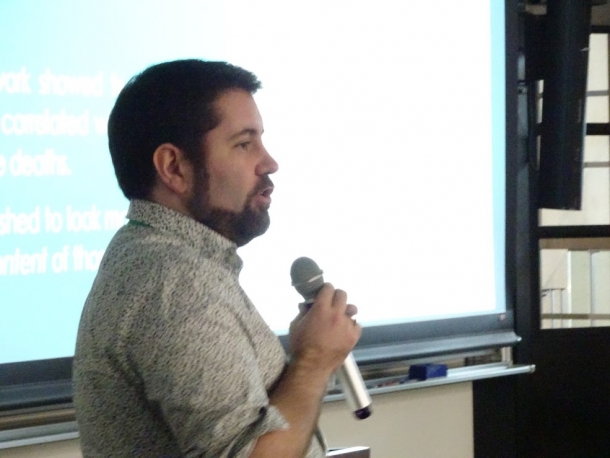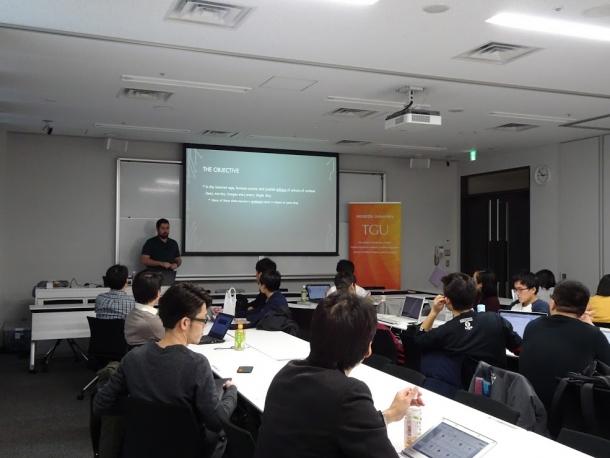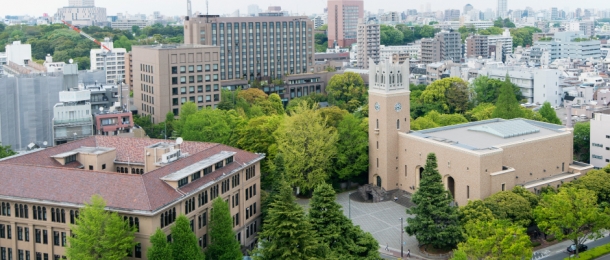Society as Data: What data scientists are doing to resolve social issues
Mon, Feb 18, 2019-
Tags
Web news, keywords for search engines, and posts on Instagram, Twitter and other social media alike… In society today, we are constantly producing new data by the second.

New data is produced whenever a post is made on social media (Photo credit: Lisa Fotios on Pexels)
Data science is a booming field in which all these data are analyzed to extract information or to generate new values. To elucidate what data science could do and draw more researchers and students into the field, the symposium Society as Data was held on January 29, featuring studies which investigated social issues with the help of applied data science methods. Organized by the Center for Positive/Empirical Analysis of Political Economy, this symposium was a capstone event for Data Science Week at Waseda held during January 28 – February 1.
Waseda University President Aiji Tanaka, who is also a political scientist specializing in voting behavior and public opinion, gave the symposium’s opening remark.
“You must always consider the human factor when conducting surveys,” he said to the social scientists and students in the room. “Your knowledge on how to measure human behavior can result in a critical outcome which may change the world.”
Analyzing discussions of suicide on social media for intervention
A presentation on the online discussions of suicide and its real-world effect was given by Robert Fahey, a PhD candidate focusing on political communication, contemporary politics and text analysis methodology. He discussed the emotional responses to suicide deaths of celebrities on Twitter and subsequent increases in suicide (known as the Werther effect), and an ongoing project looking at Japanese keywords and key phrases, for example, kietai [I want to disappear], that could indicate suicidal ideation.

Robert Fahey, PhD candidate at the Graduate School of Political Science
“By analyzing suicide discussions on social media, we can potentially identify individuals or populations who are at risk of suicide from the types of discussions they are having or the networks they are participating in,” he explained. “There is an opportunity for potential interventions and targeted advertising that can push people toward counseling services.”
Detailed information on the other presenters and their presentations can be found here.
Knowledge from both the sciences and humanities for bigger results
Data Science Week was organized by Michiko Ueda, associate professor of political science. She said that through this event, she learned that many faculty and students are interested in incorporating applied data science methods into their research.
“As part of Data Science Week, we organized workshops on data science methods, for instance, text analysis using R (programming language). Many students participated in these workshops, in which some of them had to be waitlisted. I am very excited by the fact that research using data science methods are expected to increase from now on. Hopefully, more classes on these methods will be taught at Waseda.”

Different workshops were held during Data Science Week
Professor Ueda added that the network of researchers from within and outside the university has expanded as a result of this event. Further, she also expressed how she feels that collaboration with other fields is extremely crucial.
“Currently, interdisciplinary research merging the sciences and the humanities together may not be as common as it should be, but data science is a field where significant results may be achieved through knowledge from both areas of study. The Center for Data Science at Waseda and D-DATa program can take the lead in doing so, and I believe that data science research will evolve significantly around this institution and graduate program. In the future, I hope that the Center for Data Science will act as a mediator to advance research collaborations.”
About the Center for Data Science

The Center for Data Science was established on December 1, 2017. It integrates and creates new knowledge, train scientists who can contribute to the resolution of complex, global social issues, and enhance Waseda’s overall research capabilities by utilizing the full strength of its resources as a comprehensive research university to provide a platform that integrates the latest developments in data science with the knowledge built across both the sciences and the humanities. Additionally, the Center is forming a large-scale network with both domestic and overseas universities and enterprises, and striving to disseminate practical education and state-of-the-art research s well a global center for advance research and education models.














